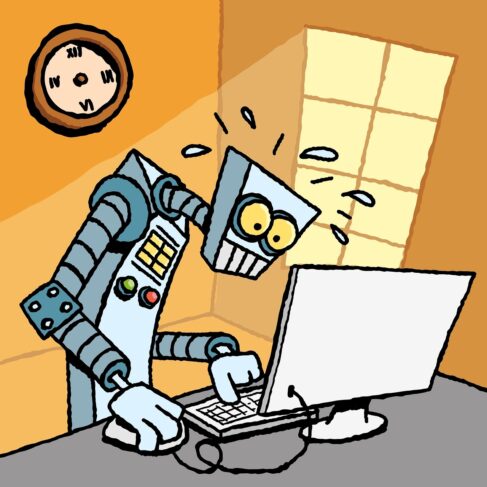Artificial intelligence (AI) is on everyone’s lips, in conferences, articles and even discussions around the coffee machine. This trendy word attracts, intrigues, sometimes worries and, above all, ends up tiring us. But what is it really? Do advances in AI mean we’re going to lose our jobs? I take the time to analyze this question and answer it pragmatically.
AI: two letters boosting sales
Today, the mere mention of artificial intelligence has the power to capture attention. According to some studies, articles with “AI” in their title record a significant increase in the number of clicks, sometimes up to 30%. Conferences on the subject are attracting record attendance rates, bringing together professionals from all walks of life. I myself am tempted to attend these events or read these articles. My observation: it’s often disappointing.

So why all the hype? Conspiracy theories aside, the algorithms that push content on social networks or news sites prioritize what makes us stay the longest. Beyond curiosity or questions, there’s a strong desire to learn and understand this technology.
This word is used as soon as algorythm manipulate big volumes of data. I explain the history and various technologies in this other article.
AI is NOT a silver bullet, solving all your issues
IWhatever its promoters state, it is only a tool amongst many others. Would you use a screwdriver to knock a nail? It is feasible, but far from the best solution. AI, as every technology, has strengths and limits, its efficiency is relative to the context.
Before purchasing an “AI” stamped solution, you must use a methodological process:
- Define the problem to solve
- What is the root cause?
- What are your constraints?
- What will be different after you implement the solution?
- What are your objectives?
- Choose the appropriate approach and technology
- Pilot, proof of concept, massive deployment.
- Work organisation, process improvment, team training.
- Automatization, modelization, robots, agentic AI.
By taking the time to evaluate your needs and associated solutions, you avoid buying unnecessary or inefficient applications, and add real value to your process. In my next article, I’ll talk about automating waste.
What about my job?

The fear of losing one’s job to AI is understandable, but deserves to be qualified. History shows that every technological revolution has transformed jobs. Take the example of industrial robots: they have reduced tedious manual tasks such as shovelling or milking cows, but they have also created new roles, such as piloting machines and managing exceptions.
Jobs that used to be physical now require technical expertise and the ability to intervene in complex situations. For example, a farmer intervenes manually when automated milking is impossible, as in the case of an injured cow. In delicate situations, the machine operator can call on the help of someone close by.
In fact, AI and related technologies tend to enhance our capabilities rather than replace them. They take over repetitive or tedious tasks, freeing up time for higher value-added activities.
So what? Today you need to understand this technology and position yourself as an expert capable of interacting with AI, thereby strengthening your relevance in the job market. Test generative AI solutions, look at analytical AI models and results, and see what you’re doing that it won’t be able to do as well as you.
AI is not an end in itself, but a tool. Used with discernment, it can be a powerful lever for rethinking work, helping professions evolve rather than being eliminated.
Let’s dream together: an AI serving humanity and our wellbeing…
In 1930, the British economist John Maynard Keynes, in his essay Economic Possibilities for Our Grandchildren, (he was talking about me) predicted that technological advances would drastically reduce working hours. He imagined a future in which people would work only 15 hours a week, thanks to increased productivity and automation.
In 2025, we know all too well that his optimistic vision has not materialized as planned, largely because of the way the gains have been distributed. We should aspire to a future where we all work less, thanks to a fairer distribution of wealth. But that’s another story.
© Robot drawing: Richard Drawings 2023
